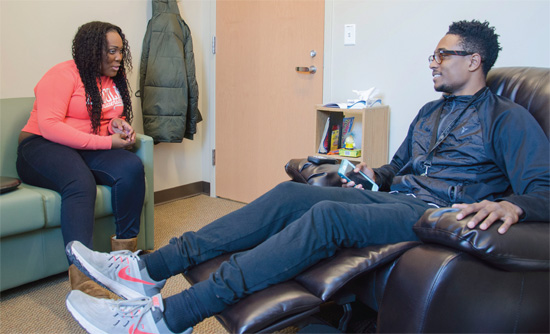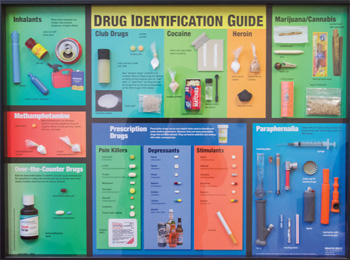
Brejona Whitlock wanted a place on campus to escape—if only for a few minutes—during a stressful situation at her residence hall. The Lincoln University senior found herself in the Wellness Center and remembered hearing about the Relaxation Room, a quiet space tucked away on the second floor in the Counseling Services suite complete with a massage chair, a tabletop water fountain, and adjustable lighting.
Whitlock ascended the stairs and entered through a set of frosted glass privacy doors, where she signed in, and within seconds was in the Relaxation Room, enjoying a brief respite.
“In the Relaxation Room, you can play your own music, turn the lights low, and just get away,” said Whitlock, a Pittsburgh native majoring in Pan-Africana studies and mass communications. Whitlock and her classmates are becoming accustomed to the innovative services like the Relaxation Room that Lincoln’s Counseling Services offers to support students’ mental and emotional health each semester.

Campuses across the nation are seeing a spike in the need for mental health services. Young adulthood is a critical period for mental health, according to a recent Time Magazine report that says 75 percent of mental illnesses are onset by age 24 and 43.8 million adults, about one in five, experienced a mental illness in 2012, citing the Substance Abuse and Mental Health Services Administration.
At Lincoln, Counseling Services aims to address students’ mental and emotional well-being through brief psychotherapy, group counseling, workshops and outreach programming assessments, and referrals—all free—to enrolled students in a degree-granting program. Faculty and staff training, consultation and outreach/prevention programs are also services provided.
This diverse array of services is coordinated by Rachel Manson, who has served as director of Counseling Services for 10 years, who said college life can be both exciting and challenging.
“It can be stressful,” Manson says. “Social and emotional concerns can interfere with academic performance and social interaction. Our purpose is to help students with personal dilemmas in their personal development or with painful life events so they are better able to respond to problems or concerns.”
Why Students Seek Help: Voluntary, Required, Pressured, or Mandated
Students sometimes self-identify an issue and voluntarily seek help, but more often they arrive at the Center for one of three reasons.
Belinda Madison, a psychotherapist, has been providing individual counseling and psychotherapy services to students at Lincoln University since 2008. She said students are required, pressured, or mandated to attend counseling. The requirement often stems from the role the student chooses to take on campus, such as residence hall advisors who are required to take QPR suicide prevention training and Mental Health First AID.
The pressure most often comes from peers, but faculty play an important role. Faculty see students weekly, and so they often can spot a change in behavior, such as a student’s grades, attendance, participation, or even the student’s attire. Faculty often contact Counseling Services to discuss a student concern and are advised to have the student call or suggest that the professor or instructor sit with the student and make the initial call together.
”There is a resistance, because for many students, this is their first experience in counseling,” Madison says.
The mandate for a student to go to Counseling Services usually arrives from the Judicial Board, which is the group of campus staff, faculty, and students tasked with reviewing violations of the student handbook. Once appearing before the Judicial Board, depending upon the offense, students might be assigned five sessions of drug and alcohol psycho-education or a four-week session of anger management.
Tamara Augustin, a Certified Advanced Alcohol & Drug Counselor, manages the psycho-education program. Students complete evidence-based intervention program designed to motivate students to reduce their consumption using personalized information about their own use and risk factors.
The most frequent Counseling Services activity is confidential individual counseling, whether mandated or voluntary.
Confidentiality recognizes the importance of privacy and safety as the basis of effective therapy. This is one of the primary reasons clients choose to enter into a counseling relationship.
“Students want to know they can share their inner fears, secrets, and desires with a neutral party, and that individual will not, and cannot, share that information with anyone else,” Manson says.
Madison says students most often want to talk about relationships and family stress.
Other common topics include anxiety, stress, depression, self-esteem, sexual assault, grief and loss, gender identity issues, loneliness, shyness, anger and fear, and family concerns and college-related transition. Individual counseling and therapy provides students the opportunity to meet one-on-one with a professional clinician to address concerns they may be confronted with that could impede their ability to achieve academically.
One full-time and one part-time clinician are booked each day in 50-minute sessions. For 10 minutes in between appointments, time is spent reviewing the steady stream of emails from professors worried about students, report writing, and administrative tasks. Last year, 880 appointments were schedule for individual counseling; several students were hospitalized for more intensive care.
The work of Counseling Services is not strictly relegated to their sessions behind the frosted doors. Counseling staff pursue frequent opportunities to engage students where they frequent: residence halls, the dining hall, social organizations, student union, Wellness Center, classrooms—even at the “U.”
Getting in front of the students is key for students to get the support they need. Through campus-wide events, Counseling Services aims to remove the stigma that surrounds mental health issues.
In the fall semester, as part of October’s Domestic Violence Awareness Month, Counseling Services partnered with the Greeklettered organization, Omega Psi Phi Fraternity, Inc., for a dining hall lunch time talk with students about domestic violence and provide them with resources on campus, and in the community.
Also in the fall, the counseling team made a special effort to engage males where they live: the residence halls. Males make up about 35 percent of enrolled students, but only two to three percent of the 10 percent of all students that ever visit Counseling Services. National Depression Screening Day is another annual outreach effort and takes place in the Wellness Center atrium. Student organizations such as Active Minds and Psychology Club engage and encourage students to take the screening. In designated privacy areas, students have the opportunity to complete a questionnaire which screens for depression, bipolar disorder, generalized anxiety disorder, and post-traumatic stress disorder. They speak with a Counseling Services clinician to review their results.
“Counseling Services is able to reach far more students with this outreach effort than waiting for students to come to our office,” Manson says.
Counseling Services presents workshops and training sessions to meet the needs of the university community. Madison has delivered presentations to parents of incoming freshmen on the psychological impact of empty nesting and conducted workshops with depression as experienced in college.
For all incoming freshman, Counseling Services coordinated and monitored sexual assault education as well as 18 sexual misconduct trainings for students, faculty, and staff.
In April, Lincoln participated for the first time in the national Fresh Check Mental Health event, which educates students and helps to address the stigma associated with counseling.
Lance Montez Wilson saves people’s lives. Not in the way a surgeon or a nurse might save a life, but rather by helping “people unpack the baggage that all of us carry every day.”
“The wounds of the psyche can last longer than any physical wound,” Wilson says. “Helping people address the deepest and darkest parts of them is a portion of the work I do as a social worker.”
Wilson, a 2013 Lincoln University graduate with a Bachelor’s of Science in Human Services went on to the Graduate School of Social Work and Social Research at Bryn Mawr College to obtain a master’s in social services in clinical social work. Wilson continued his education, earning a license in social work in Pennsylvania. Wilson is currently at Hahnemann University Hospital where he holds the title of the Neurology and Medical Social Worker, a position that requires him to use skills acquired as a case manager, social worker, and therapist.
Wilson, a Philadelphia native, did not enter Lincoln thinking he would become a social worker. He originally wanted to study biochemistry to ultimately become a forensic biochemist.
It was in a class with Patricia Joseph, a human services professor and dean of the College of Professional, Graduate, and Extended Studies, where he was tasked to find a social service agency and write a paper about it. He met with Manson and Madison to learn about the Women’s Center and Counseling Services on Lincoln’s campus. After the class, his career path started to change.
“I recall sitting down with Dr. Joseph and having an hour long conversation that ended with her saying to me, ‘Are you sure you’re in the right major/department?’”
Wilson said Joseph challenged him to think about what he wanted in a career and to take electives to explore options in sociology, anthropology, human services, and psychology.
“I initially wanted to assist people with being able to receive closure after a loved one was taken from them through forensics,” he says. “This later changed to assisting and amplifying people’s current quality of life. My personal motto became ‘helping people live their best life, now.’”
Wilson returned to Lincoln’s campus as an intern at Counseling Services as part of a requirement for his master’s in clinical social work program.
As an intern, he met students for therapy, conducted group sessions, and provided psychoeducation to raise awareness regarding topics that affect the student population such as drugs, alcohol, adjustment, date rape, among others.
Stigma and judgment prevents students from seeking help mental health issues. The fear of being viewed as “crazy” in their social circles or the fears it may reflect badly on their families are barriers for seeking treatment.
“African Americans share the same mental health issues as the rest of the population, with even greater stressors due to prejudice, racism, and economic disparities,” Manson says. Talking about problems with an outsider may be viewed as “airing one’s dirty laundry,” says Manson, which “would not be appropriate even among family. And because of the taboo surrounding discussion about mental illness there is little knowledge of mental health problems and their treatments.”
Anxiety about therapy may also be associated with a lack of knowledge about what to expect from treatment itself or if therapist will be culturally competent. Students also express fears about being involuntarily hospitalized and are subsequently reluctant to share their symptoms.
Counseling Services responds to the barriers that prevent students from seeking mental health by conducting training and collaborating with student organizations, such as the Psychology Club and Active
Minds, that support efforts to remove the stigma around mental health issues. Mental Health First AID, an eight-hour, evidence-based training designed to teach people how to help a person experiencing a mental health, addiction challenge or is in crisis and Question, Persuade and Refer—commonly known as QPR—suicide prevention training are regularly conducted. For the past several years human service majors have taken the training as a part of their class and received certification.
“Higher education is a place where students are faced with difficult transitions, and circumstances and experience painful emotions,” Manson says. “The counseling center plays a vital role in helping students cope with a wide variety of educational, adjustment, and mental health issues to successfully achieve their academic goals.”